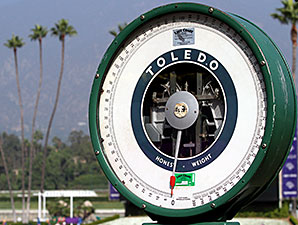Remington Park Plans to Report Horse Weights


The pre-race protocol of Thoroughbreds racing at next year's Remington Park summer-fall meet will include a quick stop on a scale where their weight will be recorded and that information will be provided to the public before the race.
Twenty-five years after Remington first started offering horse weight information to the public, track president Scott Wells will bring the scale to the Oklahoma City track again in 2016. This time he hopes it not only takes root at Remington but catches on throughout the country.
Wells said it's simple information to collect and provides handicappers an extra tool while giving interesting information to new fans.
"It's one of the keys to transparency," Wells said. "Secondly it's a very important handicapping factor. And finally it's something that even novices can relate to."
Under the plan, horses will be weighed at a uniform time at the track's receiving barn. The scale is in a set area under some dirt that is level with the ground, so that horses do not even realize they're stepping on a scale. The electronic scale accounts for any added or lost weight from shifting dirt by re-setting to zero after each horse exits.
The weight will be recorded at the receiving barn before the race and relayed to the track's TV crew to be reported during the post parade and on the simulcast signal. Wells said he is working with Equibase to have weight information recorded in previous Remington starts included in the track program and will find other options to provide that information if it's not ultimately available in the program.
Wells noted that weights are recorded in greyhound racing. He said in Thoroughbred racing in Asia and South America, handicappers expect such information to be made available.
"You'd have a riot if you didn't provide the public that information," Wells said of those overseas tracks, adding that a lot of handicappers used weights not so much to pick winners but eliminate horses who may be racing into fitness.
As a former trainer and in his years working for tracks in the U.S. and overseas, Wells believes horses have an ideal weight and any gain or loss of more than 15 pounds from that ideal weight is significant.
Wells said weight information also plays well as a topic of interest as racing tries to tell its story to new fans. He noted that it's basic information that people can relate to, and said in the early 1990s new fans seemed to enjoy having such information.
"The public just absolutely loved it and good stories just fell into our laps. We had a filly named Chigger's Chance who was the lightest horse we ever weighed, I think she came in under 800 pounds. And then we had a horse named Bionic Prospect and he weighed 1,327—racing fit," Wells said. "So there's an enormous difference."
Wells said most people have tried some athletic endeavors and understand there is an ideal weight. He said in the 1990s the track received local news coverage as well as a national story from Sports Illustrated on its weight reporting.
"The marketing department loved it. We had 'Tale of the Tape,' and 'Battle of the Bulge,' and 'David vs. Goliath'," Wells said. "And of course everyone relates to their own body weight and understands that it's part of athletic prowess. Most human athletes have their height and weight listed."
Wells said some horsemen in the 1990s initially had some apprehension about the process, but once they saw that horses didn't even realize they were being weighed most quickly were comfortable with the idea.
"It soon got to the point that you'd go into the track kitchen and every horsemen was talking about what their horses weighed," Wells said.
Wells said the weight information also could be used for scientific studies of issues important to racing, like race-day medication administration. Wells said based on Remington's previous foray into weighing horses, he noticed that first-time Salix users typically lost 20 to 25 pounds.
Wells also plans to add weight reporting at Lone Star Park and he hopes other tracks pick up on the idea and weight reporting eventually becomes standard in past performances.
